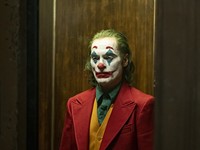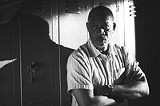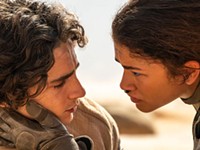[
{
"name": "500x250 Ad",
"insertPoint": "5",
"component": "15667920",
"parentWrapperClass": "",
"requiredCountToDisplay": "1"
}
]
Once again, to the delight of publicists, entertainment reporters, clothing designers, and the various people who really make movies --- bankers, lawyers, agents, accountants, etc. --- next Sunday, the Academy of Motion Picture Arts and Sciences presents its annual awards ceremony, more familiarly known as Oscar night.
The moment represents the film industry's own depthless and deathless love of self-congratulation, a shiny, expensive celebration of itself. Although every serious film critic should properly regard the whole business as a scam, a sham, and a shame, all of them also feel the usual obligation to comment on the nominations, speculate about possible winners, and denounce the absurdity of the whole occasion.
Whatever the importance and excellence of work in a number of technical categories, like sound mixing and editing, makeup, and so forth, most members of the audience really want to witness the big awards for the recognizable achievements --- acting, directing, and above all, the best motion picture.
Although 2004 was a pretty good year for the movies, for a change, the nominations still somehow tend to follow some distressingly familiar patterns. As usual, a significant gap separates the probable winners from those who actually deserve an award, which of course every self respecting film critic (some do respect themselves, really) rushes in to fill.
The various nominations in all the best known and most prestigious classes, for better or worse, demonstrate the power and persistence of what might be called Hollywood think, a habit of mind that dominates the ceremonies. The nomination of The Aviator in the Best Picture category provides perhaps the juiciest example of that familiar phenomenon. A big --- i.e. long and boring --- biopic about a famous Hollywood figure, reflecting some of the glory days of the film industry itself, with actors playing famous actors of the industry's Golden Age, the film seems an exact fit for the Academy's tastes, a movie about the movies.
All the nominations that mention The Aviator in fact simultaneously reveal the absolute appropriateness and the wonderful absurdity of the industry's thinking. That Leonardo DiCaprio should be named in the Best Actor group for spending three hours stalking stiffly around a static set with a severe frown on his face, behavior that he and the voters (and a number of critics) apparently mistook for acting, pretty much sums up the whole sorry business.
His ridiculous performance recalls the three hours of strutting and snarling and sneering that won high praise for the wretched Daniel Day Lewis in the last Scorsese horror, Gangs of New York.
The Aviator's other acting nominations, of Alan Alda and Cate Blanchett, as the best male and female supporting actors, mesh perfectly with the DiCaprio choice. Alda turns in an astonishingly flat and boring performance as a corrupt senator, and Blanchett's caricature of Katherine Hepburn begins by arousing laughter and ends up inducing nausea. A movie so tediously long, so spectacularly bad, so laden with so much clumsy baggage, under the command of a "prestige" director, will probably, alas, win it all. Oscar loves a steamroller: bet the mortgage on this one.
Because the Academy also prides itself on liberal compassion and political correctness, the Best Actor award will probably go to Jamie Foxx, for Ray. In a year with a refreshingly large number of talented and deserving people of color nominated in various categories, Foxx should win for playing a handicapped and recently deceased icon of contemporary music, which constitutes the film version of a trifecta.
The Oscar really should go to Don Cheadle, however, who simply carries Hotel Rwanda in the shining vessel of his great talent and courage, with an intense and truly remarkable performance that does justice to the subject and ranks among the most outstanding displays of acting in all of contemporary film.
Annette Bening certainly deserves and probably will win the Oscar for the best performance by a female for her work in Being Julia, a completely charming movie that allows her to display her impressive versatility. The award for Best Supporting Actress should rightly go to Sophie Okonedo, for her performance as Don Cheadle's wife in Hotel Rwanda; Laura Linney also acquitted herself admirably as the sex researcher's wife in the important and underrated Kinsey.
In one of the more mystifying Oscar touches, the fact that Virginia Madsen received a nomination for what amounts to perhaps seven minutes of screen time in Sideways, suggests both the paucity of possibilities and more of that Hollywood habit of mind. The voters here grasped the opportunity to honor a solid but absolutely unexceptional toiler in the vast fields of spooling celluloid.
Another African American, Morgan Freeman, turned in a performance in Million Dollar Baby that, like Cheadle's in Rwanda, stands head and shoulders above the rest of the competition. His powerfully understated presence, the deceptively casual rhythms of his speech, his small movements and slight gestures fit the style and substance of the movie perfectly, providing an object lesson in the challenging techniques of screen acting. He plays the part of the washed-up boxer Scrap, Clint Eastwood's friend, as if he were born for it, perhaps the highest compliment one can pay an actor; whoever else is second best trails miles behind Freeman.
As with his Mystic River of a year ago, the estimable Clint Eastwood once again directed the best picture of the year, Million Dollar Baby, which will probably lose out to The Aviator for all those Hollywood reasons cited above. Too gritty, too real, too offbeat and downbeat, the film avoids most of the usual meretricious touches that attract the attention of voters, who tend to delight in bloated budgets, flashy names, epic length, and heavy hype, in other words, in movies like Dances With Wolves, Titanic, Gladiator, Lord of the Rings, and, alas, The Aviator.
The year in pictures, incidentally, exhibited some unusual trends, including the appearance of three highly publicized biopics, Ray, The Aviator, and the terrifically disappointing De-Lovely. The last title, a film about Cole Porter, demonstrates that a fascinating subject, a glamorous context, and some of the greatest popular music and light verse of the 20th century, combined with a lavish expenditure of money, still cannot substitute for a decent script and imaginative direction. It also proves that no matter how much money a production company spends on both a film and its advertising, now and then, thank goodness, Hollywood thinking will not necessarily prevail.
Another trend, noticed by few, or perhaps only by one, featured some new directions in sex, always an important subject in the cinema. The kinkiest moment of the year, at least in an allegedly serious, nonpornographic movie, Birth, showed an 11-year-old kid slipping into the bathtub where Nicole Kidman is sudsing up. The image discreetly dissolves just as it has raised such matters as the Oedipus complex and what a psychiatrist once termed the seduction of the innocent.
The most striking innovation, however, involves the bizarre possibilities of wooden characters (not just the usual bad actors) and sex, or at least procreation, in two movies, Team America and Seed of Chuckie (maple? oak? walnut?): Make of that what you will, Oscar.
Speaking of Oscars
-

'Another Round' tips the bottle to a tipping point
Dec 4, 2020 -

The 7th Annual Lubies
Feb 5, 2020 -

92nd Academy Awards nominations
Jan 17, 2020 - More »
Latest in Movie Reviews
More by George Grella
-

Film Review: "Cake"
Jan 26, 2015 -

Film Review: "American Sniper"
Jan 19, 2015 -

Film Review: "Inherent Vice"
Jan 12, 2015 - More »






